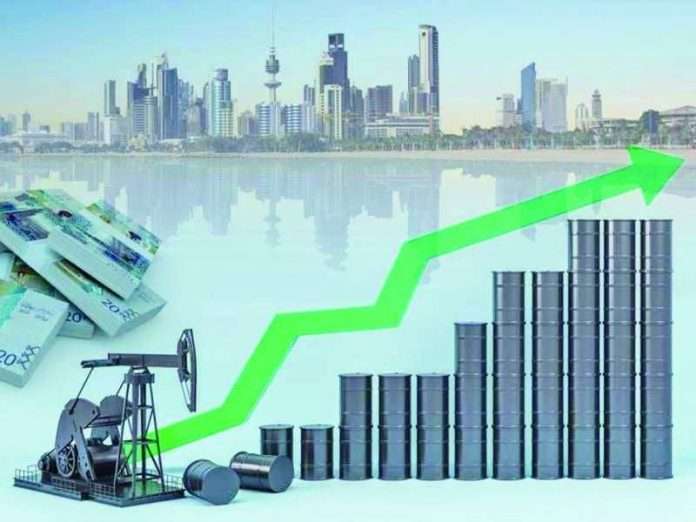Latest News
- Kuwait-Jordan Durra Field Joint Statement Rejected By Iran
- GTD Cracks Down On Vehicle Noise Pollution In Sulaibiya
- Mystery Of Dead Fish At Shuwaikh Beach Sparks Urgent Action
- MEW To Complete Links With The Interior And Justice Ministries B...
- 8 Expats Jailed For Bribing An Officer To Obtain Driver's Licens...
- Weekend Weather Is Expected To Be Hot
- From Tomorrow, Traffic Diversion On Third Ring Road
- Ministry Of Health Refute Rumors On Non-availability Of Antibiot...
- Amir Of Kuwait And Jordan King Renew Commitment To Regional Secu...
- 37 Arrested With Narcotics And Firearms
- Outrage Over Candidate's Arrest
- Six Stores Shut Down In Jahra For Selling Fake Goods
9.5 Percent Economic Growth Is Expected This Year In Kuwait, Most Vulnerable To Oil Price Fluctuations

Kuwait's economy experienced its largest contraction since 1990. Is it preparing this year to record its best performance in a decade, so what difference can a few years make? In an article published recently by the Banker magazine, the author asks, 'After recording Kuwait's largest contraction since 1990, is it preparing to achieve its best performance in a decade'?
The local Arabic newspaper was quoting sources as saying that the steady recovery in oil prices - whose exports account for about 90 percent of Kuwait's revenue - made the Kuwaiti government confident about reducing the government's deficit in the next fiscal year, even before the new price increases as a result of the Russian invasion of Ukraine, alongside the sharp decline in concerns about liquidity.
Oil prices have risen, bringing temporary respite to the economic challenges in Kuwait. This coincides with a easing of pandemic restrictions as the number of cases has decreased and the market has improved as Kuwait Stock Exchange companies reported increases in their profits of 398 percent for the first nine months of 2021.
In the article, the Financial Center Company's Ali Khalil talked about how he expected that a strong recovery in oil prices, increased government expenditures on infrastructure projects, and reforms would lead to stronger economic growth.
Despite the recent increase in oil prices, the magazine believes it is only a temporary respite, since a price correction is expected at the end of this year. Furthermore, recent increases may undermine incentives for making painful but necessary structural changes in a country's economy in the long run.
In view of Kuwait's economy's lack of diversification, it is considered the most vulnerable to fluctuations in oil prices, as demonstrated by its experience in the past two years. During the early stages of the Covid-19 pandemic, the Gulf economy was most affected by a drop in oil prices in 2020, which dropped to about $30 a barrel.
With a record deficit since the 2014/2015 fiscal year, the collapse of oil revenues raised worries about a liquidity crisis, and the continued political paralysis has made it difficult for Kuwait to borrow from international markets. However, the Ukraine crisis pushed the price of crude oil to more than $120 per barrel, and that was accompanied by an increase in fixed prices after vaccination campaigns worldwide, and therefore Kuwait's GDP is likely to recover. Capital Economics projects that the country's economy will grow by 9.5 percent this year as a result of high oil prices.
Despite the expectation that oil prices will decline again by the end of the year, James Swanston, an economist with Capital Economics for the Middle East and North Africa, suggests that oil prices will remain high during the coming months due to the conflict in Ukraine.
As a result of ongoing concerns about the ongoing conflict in Ukraine, the government expects oil revenues to rise 83.4 percent to 16.7 billion dinars during the next fiscal year 2022/23.
In 2020, a new law mandated that no more than 10 percent of oil revenue would be transferred to the Future Generations Fund, as the current account continues to be deficit.
Those concerns about Kuwait's public finances would be greatly relieved by this move, according to Swanston.
Additionally, the additional oil revenues are expected to reduce the state's overall budget deficit, which comes to approximately 12.1 billion dinars next year, by 74 percent.
If oil prices exceed the budgeted $65 per barrel by the end of the fiscal year, Khalil says, the government may be able to return to a surplus.
Trending News
-
 Kuwait Implements Home Biometrics Services Ahead O...
14 April 2024
Kuwait Implements Home Biometrics Services Ahead O...
14 April 2024 -
 Kuwait Airways Provides Update On Flight Schedule...
14 April 2024
Kuwait Airways Provides Update On Flight Schedule...
14 April 2024 -
 Kuwait Airways Introduces Convenient Home Luggage...
15 April 2024
Kuwait Airways Introduces Convenient Home Luggage...
15 April 2024 -
 Expat Residency Law Amended By Kuwait Ministerial...
20 April 2024
Expat Residency Law Amended By Kuwait Ministerial...
20 April 2024 -
 Two Expats Are Arrested For Stealing From Salmiya...
17 April 2024
Two Expats Are Arrested For Stealing From Salmiya...
17 April 2024 -
 An Egyptian Expat Dies At Kuwait's Airport
11 April 2024
An Egyptian Expat Dies At Kuwait's Airport
11 April 2024 -
 Bay Zero Water Park Kuwait: Summer Season Opens Ei...
11 April 2024
Bay Zero Water Park Kuwait: Summer Season Opens Ei...
11 April 2024 -
 Kuwait Airways Resumes Flights To Beirut And Oman...
15 April 2024
Kuwait Airways Resumes Flights To Beirut And Oman...
15 April 2024 -
 Temperature Increases Cause Electricity Load Index...
21 April 2024
Temperature Increases Cause Electricity Load Index...
21 April 2024 -
 Thief Returns Stolen Money With An Apology Letter...
15 April 2024
Thief Returns Stolen Money With An Apology Letter...
15 April 2024












Comments Post Comment